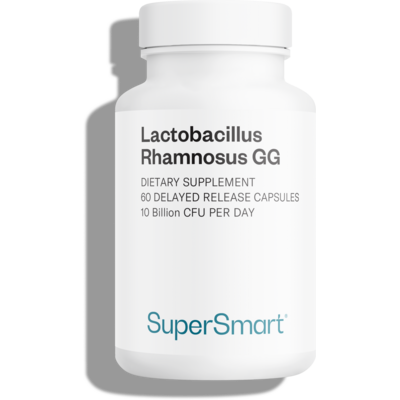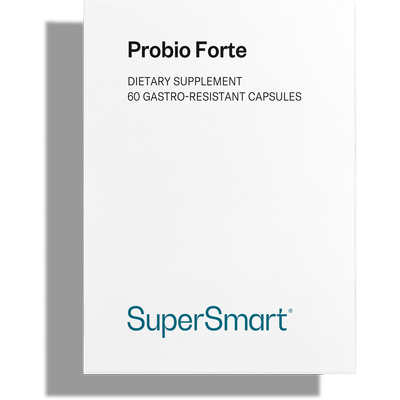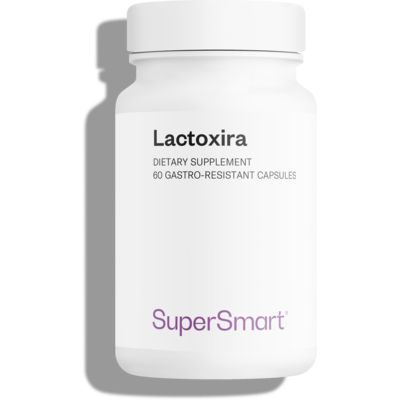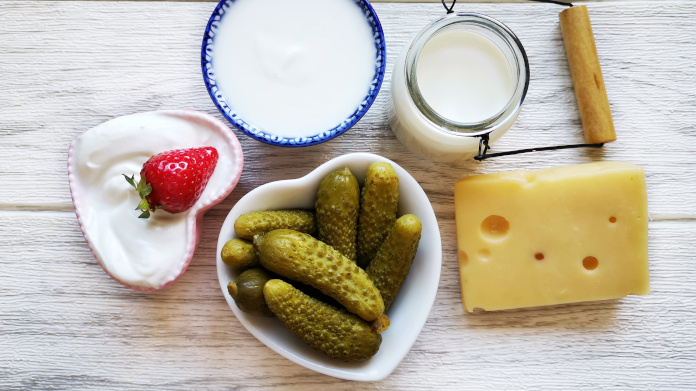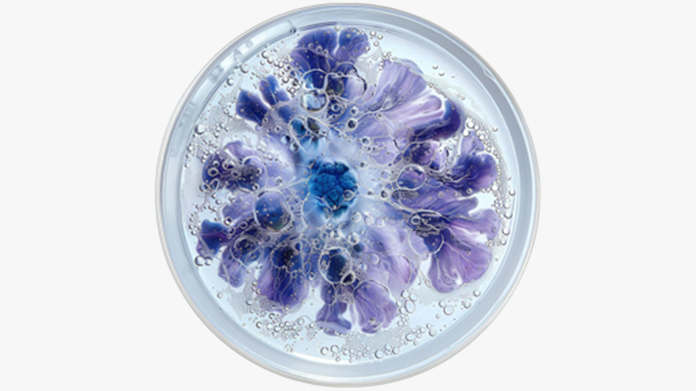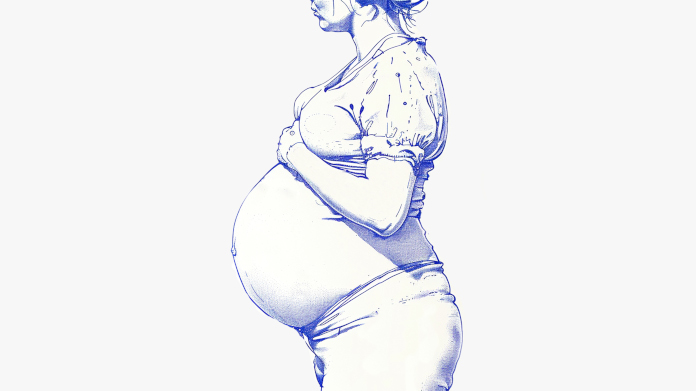Pregnancy: which probiotics are recommended?
Probiotics, the live microorganisms able to exert effects on the body, are now popular across the globe. But which ones are of most interest to pregnant women?

Is it safe to take probiotics during pregnancy?
With a significant body of research now demonstrating their safety and efficacy, probiotics have finally become legitimate natural treatments for supporting not only gut microbiota balance, but even health in general, according to a growing number of scientists.
However, their potential use during pregnancy is still the subject of discussion, given the vulnerability of a pregnant woman and her unborn child.
In 2021, the authors of a meta-analysis suggested that probiotics could also be considered safe for pregnant women, though they encouraged further study and strict monitoring of their use in mothers-to-be (1).
In the case of pregnant women, we would always recommend consulting a health professional before taking any dietary supplements, probiotics included.
The most widely-studied probiotics in relation to pregnancy
The two probiotic species primarily studied for providing support to pregnant women are:
- Lactobacillus rhamnosus, a type of lactic acid bacteria found in dairy products, which is able to survive stomach acids by adhering to the intestinal epithelium to temporarily colonise the digestive tract. In the context of pregnancy, the specific strain Lactobacillus rhamnosus GG is being closely studied in order to confirm its possible effects on digestive discomfort, gestational excess weight and gestational diabetes (2-3). Lactobacillus rhamnosus GG is available as a dietary supplement (such as the probiotic product Lactobacillus Rhamnosus GG);
- Bifidobacterium lactis, another ‘friendly’ species which also has an excellent survival rate in the gut. Bifidobacterium lactis is also the subject of intensive study to evaluate its potential effects on pregnancy-related discomfort (4). This probiotic features in certain supplements, sometimes combined synergistically with other strains (one example is the probiotic formulation Probio Forte).
Let’s now take a closer look at the types of discomfort associated with pregnancy.
Constipation and probiotics in pregnant women
Constipation is common during pregnancy. It is characterised by fewer than three bowel movements a week and excessive straining when passing stools.
It affects almost 30% of women in the last two trimesters (5). There are at least three possible reasons: the amount of circulating progesterone, the physiological slowing of the food bolus through the digestive system, and compression of the bowel by the uterus.
Can probiotics help reduce constipation?
There are two theories as to why probiotics offer potential benefits against constipation. Firstly, they may make the gut more acidic, which would increase peristalsis (the muscle contractions that move food through the digestive tract). Secondly, several studies have shown the gut flora composition of those with constipation to be significantly different from that of normal-transit individuals.
The main species studied in relation to constipation in pregnant women are:
- Bifidobacterium lactis, as mentioned above (found in the probiotic formulation Probio Forte);
- Lactobacillus casei;
- and Lactobacillus acidophilus (6).
Gestational diabetes
As in type 2 diabetes, gestational diabetes is an intolerance to glucose: the body becomes unable to regulate blood sugar levels properly.
As this intolerance develops, it produces unpleasant symptoms (thirst, frequent urination, fatigue…) and more importantly, risks for the mother (Caesarean section or pre-term delivery, pre-eclampsia…) and for the baby (respiratory distress, neonatal hypoglycemia, macrosomia (‘large for dates’)…)
Why are probiotics being studied for diabetes?
Scientists have found significant changes in the gut microbiota of those affected by gestational diabetes. These expectant mothers showed signs of inflammation, insulin sensitivity and adiposity similar to those seen in obese individuals. As a result, the scientific community is currently investigating which probiotics are most effective at restoring normal microbiota in this particular situation, in order to lower the risks posed by excessively high blood glucose levels. In terms of gestational diabetes, Lactobacillus rhamnosus GG and Bifidobacterium lactis are again the most prominent species (7-8).
Acid reflux, a common problem in pregnancy
Acid reflux is another common example of pregnancy-related discomfort, usually appearing after the 20th week. It produces particularly unpleasant heartburn (pyrosis) in 80% of pregnant women, especially in the evening, after dinner.
Are there any probiotics recommended for acid reflux in pregnancy? In 2020, an analysis of 12 studies showed potential benefits from probiotics for acid reflux, more specifically against regurgitation and heartburn, though the conclusions were not definitive (9). Pending further progress in the field, pregnant women can already reduce their acid reflux by making some diet and lifestyle changes: eating slowly, having small meals throughout the day, and avoiding acidic foods and those that slow down gastric emptying.
Probiotics for post-partum depression?
Between 10% and 20% of new mothers suffer post-partum depression in the weeks following the birth of their baby.
Unlike the ‘baby blues’, this is a serious condition which can develop as early as the 6th day post-delivery, and which requires urgent medical attention.
Potentially lasting several months, it can produce symptoms such as a loss of pleasure, profound sadness with no apparent reason, negative thoughts, etc.
Why are probiotics being studied for perinatal depression?
Recent research has shown that the body’s gut flora communicates with the brain via the vagus nerve and that it can produce neurotransmitters identical to those found in the brain such as GABA, serotonin and acetylcholine, all of which are involved in depression and mood disorders. Subsequent studies that have specifically investigated the effect of probiotics on depression, particularly post-partum depression, have identified the species Lactobacillus rhamnosus as, once again, showing the most promise (10).
Some synergistic formulations also combine other probiotics studied for their potential benefits for mental health (such as Lactoxira).
Any women who are breastfeeding should also consult a health professional before starting any supplementation.
SuperSmart ADVICE
References
- Sheyholislami H, Connor KL. Are Probiotics and Prebiotics Safe for Use during Pregnancy and Lactation? A Systematic Review and Meta-Analysis. Nutrients. 2021 Jul 13;13(7):2382. doi: 10.3390/nu13072382. PMID: 34371892; PMCID: PMC8308823.
- Ilmonen J, Isolauri E, Poussa T, Laitinen K. Impact of dietarycounselling and probiotic intervention on maternal anthropometricmeasurements during and after pregnancy: a randomized placebo-controlled trial. Clin Nutr 2011:30(2):156-64.
- Luoto R, Laitinen K, Nermes M, Isolauri E. Impact of maternalprobiotic-supplemented dietary counselling on pregnancy outcomeand prenatal and postnatal growth: a double-blind, placebo-controlled study. Br J Nutr. 2010;103(12):1792–9. doi:10.1017/s0007114509993898.
- Seif El Dahan K, Bejjani J, Nasrallah AA, Youssef L, Mladenovic A, Dosch L, Leone A, Jurjus A. Probiotics Properties: A Focus on Pregnancy Outcomes. Eur J Obstet Gynecol Reprod Biol. 2022 May;272:16-23. doi: 10.1016/j.ejogrb.2022.03.008. Epub 2022 Mar 4. PMID: 35278924.
- Armessen C, Faure S. La constipation au cours de la grossesse, 2009 Juin. Actualités pharmaceutiques. doi: ACTPHA-06-2009-48-486-0515-3700-101019-200904335
- Mirghafourvand M., Rad A.H., Alizadeh S.M., Fardiazar Z., Shokri K. The Effect of Probiotic Yogurt on Constipation in Pregnant Women: A Randomized Controlled Clinical Trial. Iran. Red. Crescent Med. J. 2016;18 doi: 10.5812/ircmj.39870
- Chen X., Jiang X., Huang X., He H., Zheng J. Association between Probiotic Yogurt Intake and Gestational Diabetes Mellitus: A Case-Control Study. Iran. J. Public Health. 2019;48:1248–1256.
- Dolatkhah, N., Hajifaraji, M., Abbasalizadeh, F. et al.Is there a value for probiotic supplements in gestational diabetes mellitus? A randomized clinical trial. J Health Popul Nutr 33, 25 (2015). https://doi.org/10.1186/s41043-015-0034-9
- Cheng J, Ouwehand AC. Gastroesophageal Reflux Disease and Probiotics: A Systematic Review. 2020 Jan 2;12(1):132. doi: 10.3390/nu12010132. PMID: 31906573; PMCID: PMC7019778.
- Slykerman R.F., Hood F., Wickens K., Thompson J.M.D., Barthow C., Murphy R., Kang J., Rowden J., Stone P., Crane J., et al. Probiotic Pregnancy Study, Grp. Effect of Lactobacillus rhamnosus HN001 in Pregnancy on Postpartum Symptoms of Depression and Anxiety: A Randomised Double-blind Placebo-controlled Trial. Ebiomedicine. 2017;24:159–165. doi: 10.1016/j.ebiom.2017.09.013.
Keywords
4 Days
great products and prices
great products and prices
Marie
9 Days
Easy to navigate site
Easy to navigate site, had what I was searching for, good price. easy order-check out
James Tucker
16 Days
My skin is clearing up nicely!
Pretty good for my skin so far.
Christian
18 Days
The new packaging is excellent
The new packaging is excellent - finally! No more squashed boxes and torn envelopes.
GORAN
19 Days
Great Product
Great Product
Larry Garrett
23 Days
Quick shipping
Quick shipping; good price. No issues!
Mary McCarty
24 Days
Thr product is very good and is helping…
Thr product is very good and is helping me on my health. Then is always on time
LUGO Luz
27 Days
Buying was fine
Buying was fine. I had problems with the website not recognizing my login info, and had to call to get it fixed. Other than that, everything was good.
David S. Clark
27 Days
Your super maca and super ginseng are…phenomenal
Your super maca and super ginseng are phenomenal supplements that compliment each other when taking them together. Fantastic feeling of well-being and lots of mid day energy without the crash.
Keith Mason
30 Days
I have had amazing results with every…
I have had amazing results with every supplement I've purchased. I am extremely satisfied with this company
kirstin Torres
30 Days
Fine products
Fine products . They are on the leading edge of online supplements. The only issue -so far-is they sometime run out of subscription items.
Jason Argos
33 Days
The ordering process is very user…
The ordering process is very user friendly and the products always come in a timely manner.
CARTER Rhonda
34 Days
The price for Dr
The price for Dr. Pero's AC-11 is reasonable and in line with his views. (my former colleague). Keep it pure.
CAMPBELL Clayton
36 Days
Right on every time.
Right on every time.
Arthur Nicholas
39 Days
They are cheaper than everyone else and…
They are cheaper than everyone else and the shipping was fast. Great company.
Patricia Adams


